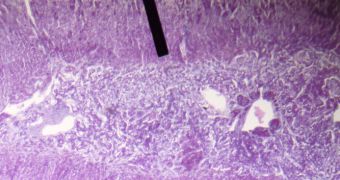An international team of scientists has recently determined that about 5 percent of people who have high blood pressure exhibit this condition because thy have benign, hormone-producing tumors on the adrenal cortex.
These are glands located on top of the kidneys, whose role is to regulate the emission of stress-related hormones. They produce chemicals such as cortisol (the stress hormone) and epinephrine, better known as adrenaline.
The adrenal (suprarenal) glands also play a role in regulating the functions of the kidneys, via a hormone called aldosterone. This chemicals regulates the osmolarity of plasma in these vital organs.
When the adrenal cortex becomes host to tumors, these forms of cancer can develop in such a way that they influence the hormonal balance of the body. High blood pressure is a consequence of this.
In the new investigation, researchers from the Uppsala University, in Sweden, and the Yale School of Medicine, in New Haven, Connecticut, managed to determine the genetic cause that triggers the formation of these hormone-producing tumors.
Details of the new investigation and its conclusions appear in the February 11 issue of the top journal Science. The main mechanism through which adrenal tumors influence blood pressure is the elevated production of aldosterone.
The condition is called aldosteronism, and its primary manifestation is elevated blood pressure. While this is established knowledge, scientists did not know why the tumors developed in the first place.
But investigators from the UU Endocrine Surgery Unit, and their American colleagues, were able to discover the causal mechanism in the new study. The investigation was conducting via a new scientific imaging method, called exome sequencing.
Investigators took sample of both tumor and normal tissue, and then applies exome sequencing to a number of genes in the two types of cells. A specific potassium channel, called KCNJ5, was discovered to play a critical role in tumor growth and development.
The channel usually regulates the passage of various molecules through the cellular membrane, in and out of the cells. When it malfunctions, tumors appear, and the production of aldosterone spikes.
“The discovery may help to improve diagnostics in connection with primary aldosteronism and cases of severe blood pressure elevation,” explains UU Department of Surgical Sciences researcher Peyman Björklund.
“The mutated potassium channel also represents a potential target molecule for treatment of the tumors in question,” he concludes.

 14 DAY TRIAL //
14 DAY TRIAL //